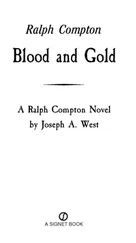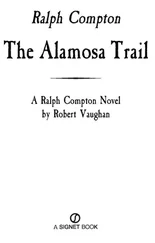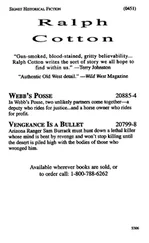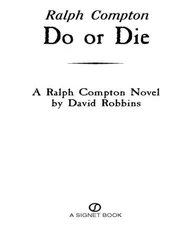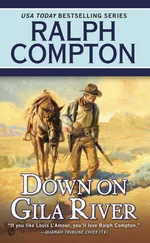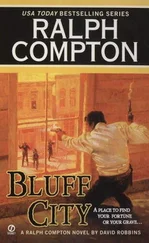“I’ve never done it, Sam. But we’ll track better come morning.”
Lake studied Pace from his scuffed, down-at-the-heels boots to the top of his bristled head.
“Know something, Sam? You’d look a sight saner if you ditched them rags you’re wearing and got yourself some better-lookin’ duds.”
Pace glanced down at himself. “I guess that’s what three years of living rough can do to a man. I look like a railroad bum, don’t I?”
“You do an injustice to bums everywhere, Sam. You look way worse.”
“Bring the lamp. There are a pile of men’s duds in the general store, if they ain’t been et by moths by now.”
Chapter 20
Jeptha and Enoch Santee were camped north of Requiem in a stand of wild oak and pines tall enough to brush the stars.
The hunt for Jess had worn them out and they were dirty, tired, and mean enough to kill anybody or anything just for the hell of it.
“Damn it, Enoch, there it goes again,” Jeptha said.
“I hear it.”
“You reckon it’s Apaches?”
“If they was close enough for us to hear their flute, they’d know we were here. And if they knowed we were here, we’d be dead.”
“Then what is it?”
“I don’t know.”
“Ain’t we gonna find out? Maybe the girl is with the flute player. Women cotton to . . . what do you call them?”
“Musicians.”
“We got to find that damn . . . musician, Enoch. I’m pretty sure we’ll find the girl with him.”
“I’m studying on it.”
Enoch, a huge, bearded man with matted hair hanging over the shoulders of his buckskin jacket, poured himself coffee, rolled a cigarette, then said, “This here’s how I figure it—”
“Tell me, Enoch. If we don’t find that uppity gal, Pa’s gonna kill us.”
“I’m about to tell you if you’ll keep your big trap shut long enough.”
“Sorry, Enoch.”
The big man lit his cigarette with a brand from the fire, then said, “The way I figure it, that flute playing is coming from a cabin nearby. It could be a farmer and his old lady, and maybe the girl came on the place and she’s still there.”
“So we’re gonna find out, huh?”
Enoch grinned, black teeth in a foul-smelling mouth. “Sure we’re gonna find out. I can smell women on the wind and I reckon we’re gonna have us some fun before this night is out.”
“What about their menfolk?”
“What about them?”
Jeptha thought about that, but couldn’t find an answer that would not draw his brother’s wrath.
In the end, Enoch answered the question for him. “We gun ’em, you idiot. Then we grab the women and do some humpin’.”
“You got it all planned,” Jeptha said, pleased.
“That’s because I’m smarter than you and a sight more refined.” Enoch rose to his feet. “Piss on the fire, then saddle up.”
“Damn, it ain’t a cabin; it’s a town, Enoch,” Jeptha said.
“I can see it’s a damned town.”
“But there’s nobody to home.”
“There’s a light down there.”
“If that’s where the girl took shelter, we’ll never be able to find her. We can’t gun a whole goddamned town.”
“Who says we can’t? Kill a few people, and then tell the rest we’ll kill a few more if’n they don’t hand over . . . what’s her damned name?”
“Jessamine, Pa calls her.”
“Yeah, Jessamine.”
“Do we wait for first light?” Jeptha said.
He was a youth with a slack mouth, a face covered in yellow-tipped pimples, and the dull eyes of an ox.
“No, we won’t wait. We’ll ride down now and take a look-see. Catch them folks early when they’re still half asleep and won’t put up a fight.”
“Enoch, can I do some of the killin’?” Jeptha said. “Seems like it’s always you and Pa does the killin’.”
Jeptha smiled. “Sure you can, boy. Do all the killing you want.”
“A woman? I’ve never killed me a woman afore.”
“Sure.”
“I want a pretty one with bows in her hair, the kind that don’t ever want to talk to me.”
“Plenty of those around.”
“Then maybe I’ll make it two. I ain’t never screwed a pair of gals with ribbons and gunned them when I got through.”
Enoch kneed his horse into motion.
“There’s a first time for everything, boy,” he said. “Let’s go.”
Chapter 21
Sam Pace glanced at the star-scattered sky and wondered if the night would ever end. The thud of his boots sounded loud in the quiet and answering echoes bounced off the buildings he passed, adding thuds of their own.
The moon hung low in the sky and the surrounding mountains caught and held its gauzy light, drawing it over their firm peaks like a woman does her shift.
Pace was tired. His back ached and a headache threatened.
As though reading the younger man’s mind, Lake said, “A while yet until sunup. Maybe we should grab your duds and then catch a few hours’ sleep.”
Pace smiled. “I guess a burying can tucker a man.”
“Depends how deep the hole is,” Lake said.
Like the rest of Requiem’s survivors, the store owners had left in a hurry, leaving most of their stock behind.
Pace had no trouble outfitting himself with new underwear, socks, a pair of denim work pants, a blue shirt, and wide canvas suspenders.
The duds smelled of dust and age, but they fit pretty well.
He tried a new Stetson hat, but reckoned it would take years to break in and shape to his liking, and decided to stick with his old one.
As Lake predicted, Pace’s appearance had improved greatly.
“Crackerjack.” The old man beamed, looking him over from head to toe. “Boy, if’n I didn’t know better, I’d swear you wasn’t even tetched in the head.”
Pace caught up Heap Leggett’s stud near the livery stable and led it inside. He’d ride the horse come morning, but now he stripped off the saddle, pitched the big animal hay, then added a few oats he shook out from the bottom of a sack.
The theft of his Appaloosa rankled him, and its recovery would be part of the reckoning he’d exact on Beau Harcourt when the time came.
And the reckoning would come soon—right after he found Jess Leslie.
Pace stepped out of the livery and stopped.
Lake stood next to him and said, “Time for some shut-eye, Sam.”
It was as though Pace hadn’t heard him.
“Mash, you see anything strange about the graveyard?” he said.
“Not so I noticed. But hell, boy, it’s a place for the dead, not the living, so it’s gonna be strange.”
“The ground was disturbed. In places it looked dug, or churned up from the bottom.”
“I didn’t see that.”
“I had a dream,” Pace said. “At least I think it was a dream.”
“What did you dream about?”
“The folks who died of the cholera rose from their graves and walked in the street. I mean, right here, where we’re at. And . . .”
A few moments passed; then Lake said, “And?’
Pace took a breath. “They were hungry, Mash. As though being three years dead had given them an appetite.”
“You mean they asked you fer food? Is that it?”
“No, but they were coming for me. To eat me. All them dead people.”
Lake thought it through for a few moments, then said, “Sam, you ain’t right in the head. A man who’s tetched can have all kinds of bad dreams. Hell, even them who ain’t crazy can have bad dreams.”
The older man was silent for a while, then turned to look at Pace. He lifted the lantern he’d taken from the general store to see the younger man’s face better.
“The wind lifts the sand and blows it around,” Lake said. “That’s what happened at the graveyard. Just the wind, boy. It was just the wind.”
Читать дальше

